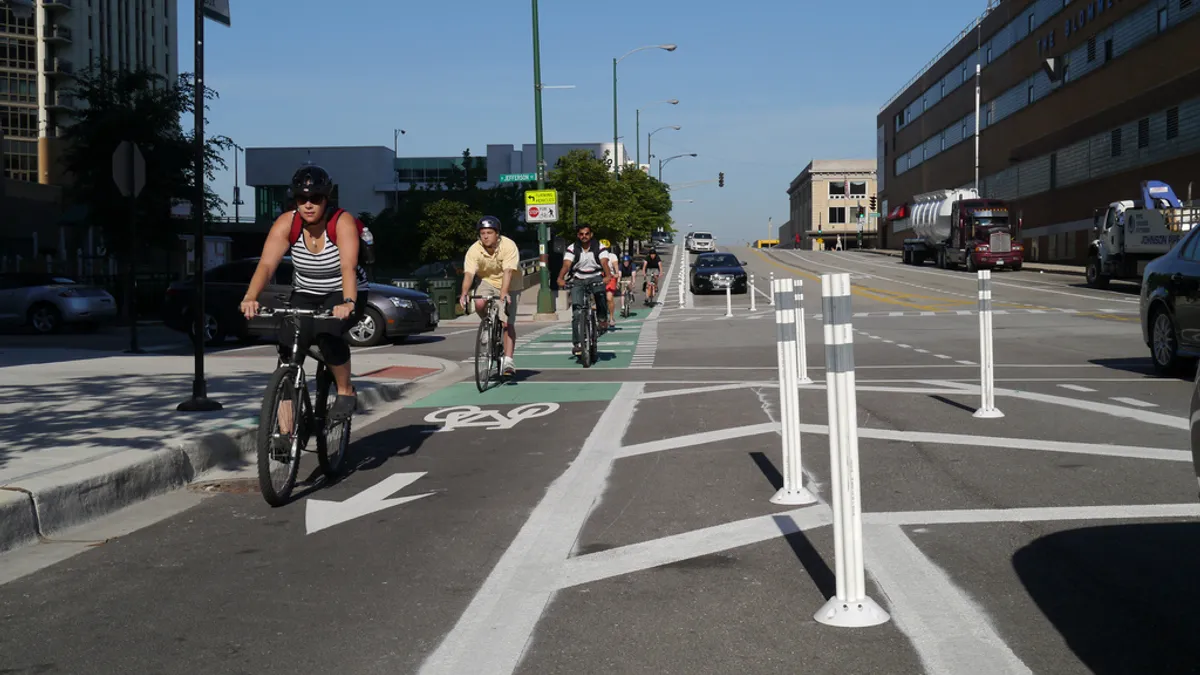Dive Brief:
- New York Gov. Andrew Cuomo introduced legislation in the FY 2021 Executive Budget to legalize e-bikes and scooters throughout the state. The language is similar to a bill he vetoed last month, except it establishes operating and safety measures that Cuomo said were lacking in the previous bill.
- The legislation would create three classes of e-bikes: Class 1 pedal-assist with a maximum speed of 20 mph, Class 2 throttle bikes with a maximum speed of 20 mph and and Class 3 throttle bikes with a maximum speed of 25 mph. It would prohibit scooters and e-bikes on sidewalks; require all riders to be 16 or older; require all Class 3 e-bike users to wear helmets; require scooter riders under age 18 to wear helmets; and set a speed limit of 15 mph for scooters and 20-25 mph for e-bikes, depending on their class.
- Local governments would have the authority to add extra restrictions such as lower speed limits or helmet requirements for e-bike users of all classes. They also would have the option to ban the devices entirely.
Dive Insight:
Cuomo raised eyebrows last month when he vetoed a highly anticipated e-bike and scooter bill, especially because he had expressed a desire to pass such legislation. Despite the strong approval from state legislators and stakeholders, Cuomo ultimately viewed that bill as "fatally flawed" because it omitted certain safety provisions for the electric-powered mobility devices.
Some of the requirements in the new legislation aren't controversial and should gain support rather easily. Most U.S. cities that permit scooters, for example, already require the vehicles to stay off sidewalks to keep pedestrians safe and reduce clutter.
But the helmet requirements could be more contentious. Discussions about mandatory helmet laws for cyclists have drawn significant controversy, as evidenced by the firestorm that erupted following the National Transportation Safety Board's (NTSB) recent recommendation that states enact mandatory helmet laws for bicycle riders of all ages. New York state currently requires bike riders under age 14 to wear helmets, and New York City requires that all commercial cyclists wear them.
Mandatory helmet laws are often referred to as a form of victim blaming. Cycling advocates are proponents of measures that proactively seek to improve driver behavior instead of targeting cyclists. The League of American Bicyclists was one group that opposed the NTSB's mandatory helmet law recommendation, suggesting voluntary helmet use instead.
Dominique Penson, transportation attorney and partner at Barasch McGarry, acknowledged that mobility companies might not be enthusiastic about helmet laws especially because shared-economy riders aren't necessarily carrying around helmets. "But that objection does not mitigate the very real dangers involved. If anything, it should encourage these companies to develop innovative solutions," he said.
"Helmets that meet the standards set by the Consumer Product Safety Commission are absolutely critical for people riding e-bikes and e-scooters," Penson told Smart Cities Dive. "I hope that, ultimately, legislators insist on safety and require helmets for all riders."
Several mobility companies provide free or reduced-cost helmets for customers who request one, but that still requires riders to carry their own helmet. Wheels announced last month that it will integrate free, shareable helmets into its e-bike fleets.
Despite the challenges surrounding this legislation, the public sentiment has been overwhelmingly positive. Transportation advocates support the measure for numerous reasons including that it provides alternative mobility options to reduce traffic and carbon emissions.
"I am absolutely thrilled the governor is looking to legalize e-scooters. The primary reason being that people don't speak enough that there are transit deserts here in New York [City]," Quemuel Arroyo, global head of community for Charge, told Smart Cities Dive. "That first-mile, last-mile issue is very much alive in New York City. I think e-scooters will provide a green, somewhat affordable new mode of transportation that New Yorkers have not had access to."
Arroyo, who uses a wheelchair, previously served as the city Department of Transportation's chief accessibility specialist. He said that while adding scooters is a good move, requiring them to be docked at hubs would be better. It would keep sidewalks clear to help the mobility and safety of people with disabilities, aging citizens and those who push children in strollers.
"When I was still at New York City's Department of Transportation, I used to hold quarterly meetings with coalition Pedestrians for Accessible and Safe Streets," said Arroyo. "They said please make sure they are docked, not dockless, when they come to New York. They're going to be in the path of travel."
Some cities and mobility companies are experimenting with docking stations. Spin and Swiftmile tested solar-powered docking stations in Ann Arbor, MI and Washington, DC last summer. And Minneapolis launched a pilot for "mobility hubs" where citizens can access forms of non-vehicular transportation including transit, shared bikes and e-scooters.
New York's state legislature usually passes the budget on or before April 1. Cuomo indicated he wants the legislature to take up the e-bike measure sooner to prevent couriers and delivery workers in New York City from further penalties, Gothamist reports. A ban on the devices is said to especially hurt the many couriers and delivery people in the city; police issued over 1,100 summons for illegal e-scooter and e-bike operation in 2019.












